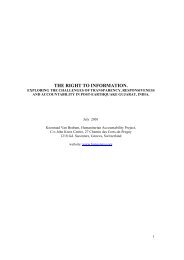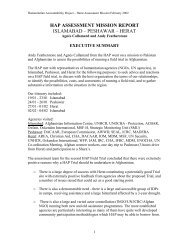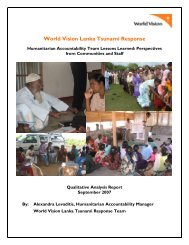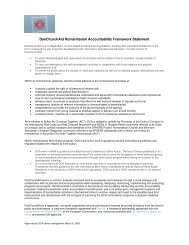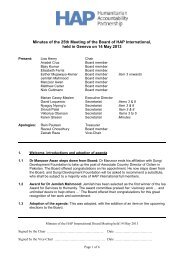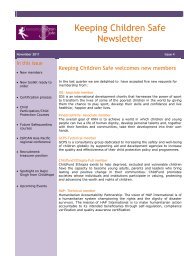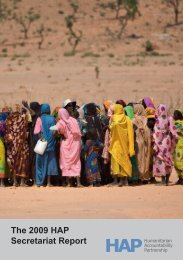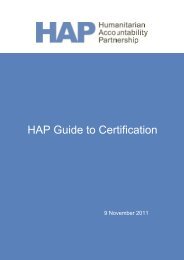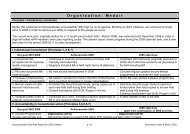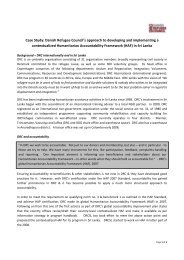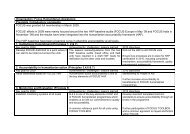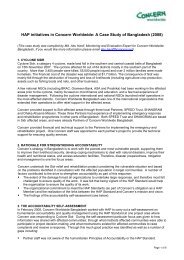Chapter Four - HAP International
Chapter Four - HAP International
Chapter Four - HAP International
You also want an ePaper? Increase the reach of your titles
YUMPU automatically turns print PDFs into web optimized ePapers that Google loves.
THE 2008 HUMANITARIAN ACCOUNTABILITY REPORT<br />
2. CAFOD<br />
2. Information, Communication, Transparency (Principle 3)<br />
• Adapt CAFOD’s communication strategy to<br />
ensure provision of information to<br />
beneficiaries (directly and/or through partners)<br />
• Develop PCM guidelines and toolkits to<br />
ensure that information regarding selection<br />
criteria and deliverables of humanitarian<br />
programmes are systematically<br />
communicated to / accessible by beneficiaries<br />
• Examples from emergency response programmes<br />
in Bangladesh, Pakistan, Myanmar are being<br />
collated to inform the development of a strategy<br />
and to integrate into PCM<br />
3. Participation and Informed Consent (Principles 3 & 4)<br />
Continue to enhance existing PCM / Web<br />
Promise trainings to highlight partner /<br />
beneficiary participation principles<br />
• CAFOD’s participation expectations are built into<br />
all core documentation within our PCM system<br />
• Challenges arise in quality assurance that the<br />
guidelines and tools are being effectively followed<br />
and to standard<br />
4. Staff Competencies<br />
In liaison with human resources explore how the<br />
CAF can be integrated into interview / induction /<br />
appraisal processes<br />
• CAFOD People (HR manual) has been rolled-out<br />
to relevant staff<br />
• CAFOD has received first quality mark under the<br />
People In Aid Code<br />
5. Complaints and Response Mechanisms (Principle 6)<br />
• Develop a strategic action plan to build on<br />
CAFOD’s existing grievance, whistle blowing,<br />
child protection and feedback management<br />
policies to establish a comprehensive<br />
complaints system within CAFOD<br />
• Aim to increase a specific number of partners’<br />
awareness of the need to have a complaints<br />
• A strategic action plan and a draft paper exist to<br />
develop and establish a comprehensive<br />
complaints system within CAFOD<br />
• Examples from programme partners processes<br />
are being reviewed, piloting taking place with<br />
KidsMedia project in UK and overseas,<br />
Bangladesh/Pakistan examples reviewed<br />
68<br />
• Clear understanding between CAFOD and<br />
partners on expectations around mutual<br />
transfer of information; explore<br />
MoUs/agreements options<br />
• Agree with partners basic set of information<br />
that is disseminated to beneficiary communities<br />
on organisational profile, mandate, Q&A<br />
commitments, programme details<br />
• Develop strategy to disseminate Caritas<br />
Emergency toolkits and <strong>HAP</strong> / Good Enough<br />
Guide tools to CAFOD staff and partners (HQ<br />
and overseas) to enhance existing practices<br />
within PCM processes<br />
• Capture learning and experiences from partner<br />
programmes to guide development<br />
• Incorporate introduction to CAF and<br />
accountability principles into Corporate Staff<br />
Induction programme<br />
• Achieve People In Aid Accreditation and<br />
maintain standard of the Code and Practice<br />
• Finalise Complaints Policy and Procedure for<br />
Overseas Programmes and disseminate<br />
• Conduct regional CM workshop and develop<br />
models for implementing complaints handling<br />
procedures in the field<br />
• Widely consult partners in the rationale and<br />
development of CM at country level<br />
93




